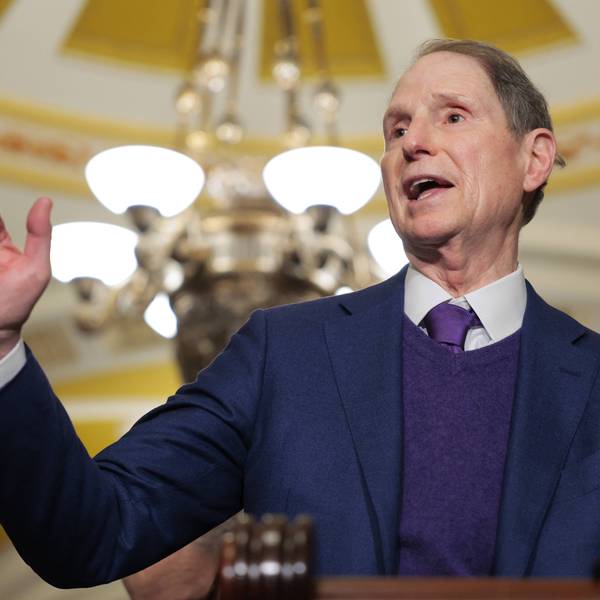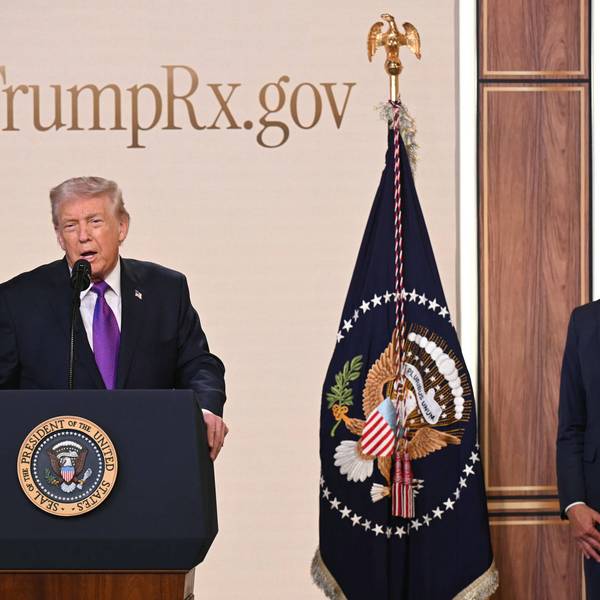While President Donald Trump's briefing on the current opioid epidemic in the U.S. on Tuesday was dominated by his aggressive threat to respond to North Korea's nuclear development program with "fire and fury," the president's comments on the opioid crisis were also met with concern by drug policy experts--as Trump indicated that he would not follow the recommendations of his own opioid crisis task force.
With a focus on the Reagan-era idea of "just say no to drugs" and threats to meet the crisis with tougher law enforcement measures, critics quickly denounced the president's remarks and the approach they signal.
Bill Piper, senior director of the Drug Policy Alliance, told CNN that Trump would find more success "focusing on the treatment side of things," noting that stricter policing of drug abuse "has never worked. That is what has been tried for decades and it has failed for every drug it has applied to, including alcohol during Prohibition."
The essential problem with Trump's approach, Piper added, is that it "makes it look like they are doing something even when they are not."
The president declined to declare the opioid epidemic, which kills 142 people per day, a national emergency, as the bipartisan Commission on Combating Drug Addiction and the Opioid Crisis urged him to in July. The Commission wrote (pdf) to Trump saying an official declaration "would force Congress to focus on funding" and "awaken every American to this simple fact: if this scourge has not found you or your family yet, without bold action by everyone, it soon will."
The group also asked Trump to "rapidly increase treatment capacity" for Americans addicted to opioids by granting waivers to all 50 states, allowing them to cover mental health treatment under Medicaid.
Opioid abuse has been on the rise since the early 2000s, following aggressive marketing by pharmaceutical companies that assured doctors and patients that prescription opioid painkillers like OxyContin and Vicodin were not habit-forming. Between 1999 and 2008, the opioid overdose rate in the U.S. quadrupled. Heroin abuse was also on the rise during this period, as many Americans turned to the cheaper opioid after being prescribed drugs.
The crisis became a focus of President Barack Obama's administration during his second term, with the White House announcing $1.1 billion in new funding in 2016 to expand treatment options for people addicted to heroin and prescription painkillers.
In Tuesday's briefing, however, Trump portrayed Obama's approach to the crisis as a massive failure as he focused on the opioid epidemic as a law enforcement problem rather than a public health issue.
"At the end of 2016, there were 23 percent fewer federal prosecutions [for drug offenses] than in 2011, so they looked at this surge and they let it go by. We're not letting it go by," Trump said.
While prescriptions have dropped in recent years since reaching a peak in 2010, as the New York Times has reported, "experts agree that the epidemic will not stop without halting the flow of prescription opioids that got people hooked in the first place." The CDC says opioids are still being given to patients in inappropriate amounts, especially in certain areas. "We still have too many people getting medicine at too high a level and for too long," said CDC acting director Dr. Anne Schuchat in an interview with the Times last month.
The president also spoke at the briefing of securing the southern border, one of his signature 2016 campaign promises, as a key component of fighting the opioid epidemic--echoing his comments in a leaked transcript of a phone call with Mexican President Enrique Pena Nieto, which was released last week. In it, Trump said, "We are becoming a drug-addicted nation and most the drugs are coming from Mexico or certainly from the southern border," and singled out New Hampshire as "a drug-infested den."
While large amounts of heroin have been brought from Mexico in the past decade, and New Hampshire has been hard-hit by the opioid epidemic, on Monday it became the latest state to sue the makers of OxyContin for fueling the crisis with its marketing tactics in the 1990s. In his briefing, the president did not mention the over-prescribing of opioids that continues to result from such practices.
As an editorial by the Portland Press Herald in Maine, which has been hard-hit by the rise in opioid use, lamented on Wednesday:
"As a presidential candidate, Donald Trump pledged to help those struggling with addiction. As president, he's squandering an opportunity to follow through on his promise, instead putting forth a substance-free plan of action that may beef up his tough-on-crime image but will do nothing to help the millions who have seen their own or their loved ones' lives ravaged by this merciless epidemic."




